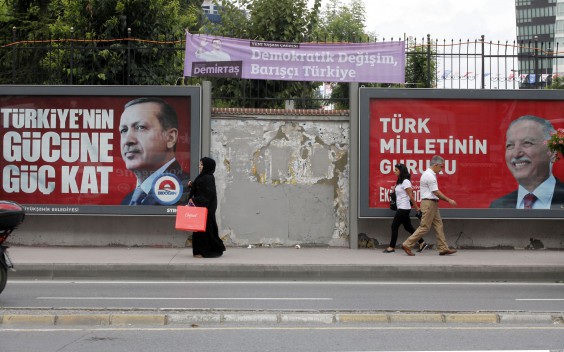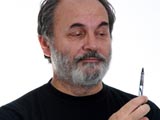Turkish Atheists Express Themselves Despite Death Threats
by Tarık Günersel / August 21, 2015 / 1 Comment

Elected in 2014, President Erdogan's pro-Islamic policies threaten dissenting voices. Photo via Wikimedia Commons.
In Turkey, atheist writers and activists face a growing climate of political hostility as Erdoğan’s government continues to distance itself from the country’s secular history.
Murders in Bangladesh
On August 7, Niloy Chakrabarti became the fourth secularist blogger murdered by Islamist militants in Bangladesh this year. The police arrested two suspects but the government has been criticized for failing to protect the writers.
In addition to PEN International, the Atheism Association (AA) in Turkey was among the organizations that condemned the recent murder in Bangladesh.

- Life is words in action, literature is action in words.
- Humans are about to destroy their spaceship Earth. Some of them are aware of this and they try to change the course of events. Will they succeed? Will more humans be alarmed and do something?
- Literature is vital and translators are messengers of world peace.
- Though I shall focus on the literary scene in Turkey and its problems regarding freedom of expression, I shall not omit the other parts of our planet. Today local is global and vice versa.

- Poet, playwright, actor, and director Tarık Günersel worked at Istanbul City Theater as a dramaturg.
- His works include Breaths of Infinity (a mosaic of poems) and My 300th Birthday Speech (short stories). His Becoming consists of his aphorisms and various ideas from world wisdom.
- His plays include Billennium, Nero and Agrippina, Sociology of Shit, Threat and Virtually Yours. He has written four libretti for the composer Selman Ada: Ali Baba & 40, Blue Dot, Forbidden Love, and Another Planet. His translations into Turkish include works by Arthur Miller, Samuel Beckett, Vaclav Havel and Savyon Liebrecht. His presentation of World Poetry Day to PEN International in 1997 led to its adoption by UNESCO. As the former president of PEN Turkey Center he was elected to PEN International Board in Tokyo from 2010 to 2012. In 2013 he initiated the Earth Civilization Project with the collaboration of several intellectuals from around the planet.
The Atheism Association in Turkey
Ateizm Derneği was established in Istanbul last year: finally an association for atheists in a country where the majority of people are Muslim. Just as secular bloggers are in danger in Bangladesh, atheists in Turkey feel unsafe. The Atheism Association regularly receives death threats.
An article from the Hürriyet Daily News, published on April 17, 2014, read:
“‘No atheists will be alone anymore, either on the streets or in courts,’ the association said via its official Twitter account. In an interview with the daily Agos in March 2014, the founders of the Initiative of Atheism Association, Tolga İnci and Ahmet Balyemez, said they thought there should be a place to provide legal support to people facing problems as atheists. ‘Even saying ‘I am an atheist’ has begun to mean an insult to Islam in Turkey. The prime minister’s remarks that ‘every atheist is a terrorist’ are being taken as normal,’ they said in the interview.”
Upon receiving death threats, the Atheism Association has a direct emergency phone line between its main office and the nearest police station. The Kadıköy district, which borders Asia, is well known for its progressive cultural milieu.
Belief is not truth
A belief injected in childhood becomes such an organic part of a person that it is felt to be a statement of truth. But a belief is not a piece of knowledge or truth. They may sometimes turn out to coincide, that is all.
Since the invention of the concept/s of gods and goddesses, not only atheism but atheists, particularly atheistic writers, have been under attack. They are being killed. Officially executed—as in Saudi Arabia and Iran.
Article 24
Article 24 of the Turkish Constitution states: “Everyone has the freedom of conscience, religious belief, and conviction.” In theory, this sounds good, but in reality, it gives no rights of belief or expression of that belief to atheists or non-believers, and very little to those who do not belong to the Sunni Muslim majority.
One example among many is the banning of the website of the Atheism Association by the Gölbaşı 2nd Civil Court of Peace in Ankara citing an article in the Turkish Penal Code that forbids “provoking the people for hate and enmity or degrading them.”
Insulting atheists
Last year, the Atheism Association filed a judicial complaint against Nihat Hatipoğlu, who tried to depict atheists as “sons of the devil,” “worshippers of the devil,” and “those responsible for all bad things in society.” According to Hürriyet Daily News, Hatipoğlu made these remarks on July 14, 2014 during a Ramadan TV program. A complaint was also filed against the private broadcaster’s executives.
President Erdoğan’s humiliation in Malaysia
During his visit to Malaysia, President Erdoğan made a speech mentioning atheists in a derogatory way. The AA protested. Still under the influence of the now President Erdoğan, the AK Party authorities banned the association’s website and 47 others under a law that prohibits “inciting religious hatred.”
Campaign against compulsory Sunni-Islam courses
The Atheism Association has recently initiated a campaign against the compulsory Sunni Islamic courses in schools. The European Court of Human Rights found the course to be in violation of freedom of thought and freedom of choice. But the AK Party government wants to keep whatever is on its side in the constitution enforced by the generals of the military coup d’etat in 1980.
The AA has also taken positive steps in harmony with social responsibility: they serve warm soup to the poor once a week.
Very few TV channels dare to host a spokesperson from the AA. Pro-Atatürk Ulusal Kanal (National Channel) is one of them.
Atatürk’s secularist legacy
After the liberation from the invasion of the British, French, Italian, and Greek forces, Atatürk led the establishment of a republic in 1923. In spite of his secularist vision, the 1924 constitution stipulated that Islam was the Republic of Turkey’s state religion. In 1928, Atatürk’s government removed the term “Islamic” from the Constitution, successfully adding the word “secular” in 1937, a year before Atatürk’s death.
Initially supported by anti-secularist US strategists, President Erdoğan — who has been pushing the official Prime Minister Ahmet Davutoğlu aside — has been trying to eradicate secularism first from daily life, and, I predict, from the Constitution.
Freedom of thought and expression is not possible without secularism.
A leading secular humanist from Bangladesh, Mr. Shahriar Kabir, made a striking three DVD documentary of Islamic fundamentalism and violence: Jihad Trilogy. His new documentary, which focuses on the vitality of secularism, is on the way.
A word about terminology
I prefer the term naturalism to atheism, but here I have used the widespread term.
Secularism does not mean atheism. In a nutshell, it is the separation of the state and religion(s).
Agnosticism is a neutral position. Atheism is a clear preference of the assumption of no god(s).
Atheism and anti-theism are also different: atheism is not against the assumption of a supernatural being. It is distinct from such a notion. Anti-theism is a more radical position: it is against the notion(s) of god(s). Was the Soviet Union secular? No. It was anti-theistic.
Erdoğan’s civilian coup d’état!
The World Affairs Journal states: “Despite the ruling of Turkey’s top court, the government had made clear in January 2015 that it would keep trying to exert greater control over the Internet with a fresh omnibus bill.” Over 80,000 websites are blocked in Turkey right now.
“The governing system has changed de facto, now it’s time to adjust the constitution accordingly!” declared President Erdoğan in Rize, a city on the Black Sea coast of Turkey, on August 14, 2015. This is simply a confession of his illegal mode of presidency.
In the meantime, bloodshed
The PKK has escalated violence, thus serving the despotism of President Erdoğan, who wants to make use of the growing chaos in Turkey.
In a recent open letter, leading Marxist Demir Küçükaydın invited the PKK leadership to an unconditional ceasefire. In an August 17th article privately distributed to some of his readers, including myself, he criticizes the PKK leadership for this offense, which—he argues—is unlikely to bring a victory but likely to help Erdoğan’s eagerness for despotism.
Ironically, Erdoğan and the PKK both seem to profit from violence and bloodshed. But for how long?





One Comment on "Turkish Atheists Express Themselves Despite Death Threats"
Thats all true. We are going to stupid conditions in Turkey like deaths about terrorism, whole people thinks there is no freedom for gays, transvestites, other people, black people and different ones. THATS RACISM!